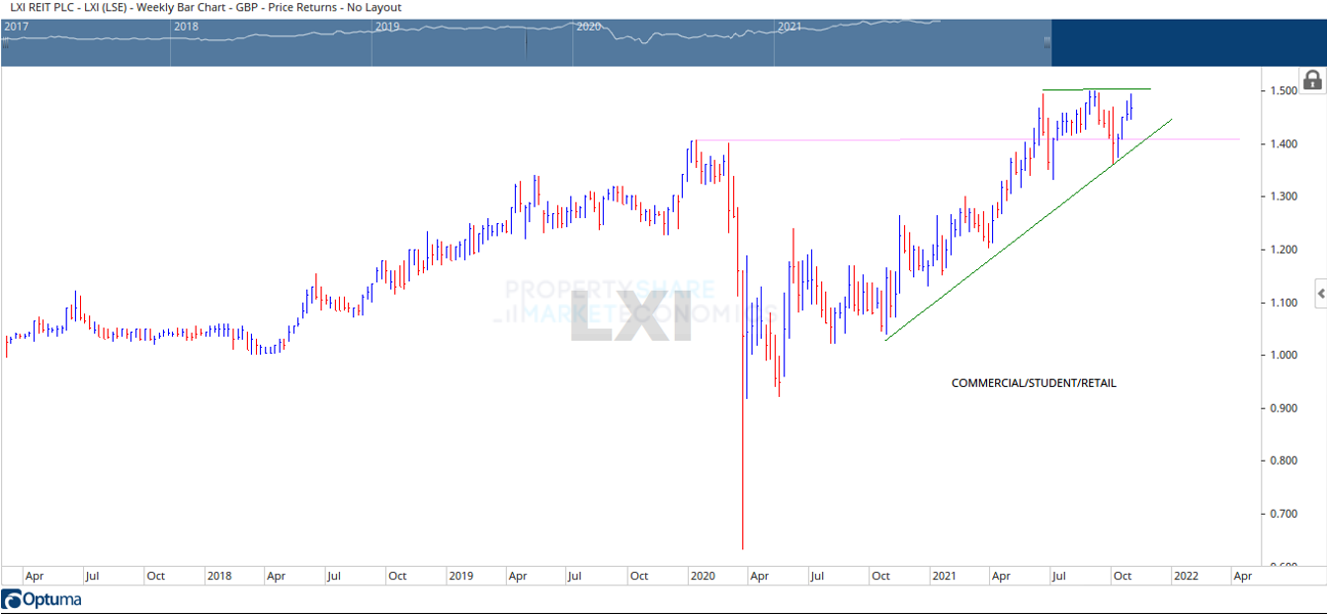If you would like to receive weekly updates like this, sign up here.
My name is Darren Wilson, Editor of the Boom Bust Bulletin (BBB), and writer of these free weekly blogs.
I do trust you find these blogs informative and enjoyable to read.
Today I wanted to reach out to you with an important announcement.
As I have explained to you in my weekly pieces, we are beginning the second half of the real estate cycle. This half of the cycle is historically the much bigger half of the cycle where much more money is made – if you know how the real estate cycle works.
To take advantage you need to have exposure to real estate assets. The cycle is, after all, a real estate cycle, so exposure to real estate is one key way to take advantage of it. The main way to do this is, of course, to do it directly through buying, selling, developing, or renting out property.
But the other way is to do it is via the stock market, through a fund or an investment trust that owns multiple properties.
Here the benefits are: much greater liquidity, which means it is easier both to buy and sell. Add in diversification too as you can have exposure to both residential, commercial, and industrial property. It also takes much less time to buy in (as any homeowner or property investor knows all too well).
Therefore, it is important you consider doing at least some property investing through the stock market. And the single best way to do it is via Real Estate Investment Trusts, or as they are commonly known, REITs.
The question is then how to identify which REITs to buy and when you should them to your portfolio. There are hundreds and hundreds of listed REITs trading on exchanges.
My colleagues and I at Property Sharemarket Economics (PSE) specialize in just this. We follow the investing techniques of a W.D. Gann, one of Wall Street’s finest ever traders.
When Gann wrote about how he would start to invest, he spoke about beginning a ‘campaign’.
He would use his knowledge of how cycles affected his chosen market and then study them to determine when and where the periods of accumulation were.
Once identified he would set his buy orders to enter just before price broke out and trade the ensuing breakout.
This is how PSE teaches its members to invest too.
PSE co-founder and Director Akhil Patel recently sent an email detailing to members how PSE intends to guide our members into the REIT sector.
Below is the email in its entirety. As sent to Property Sharemarket Economics (PSE) members.
I’ve said often that the second half of this real estate cycle is going to be huge, with more wealth created in the next five to six years than ever before in history. You cannot afford to sit this one out. And one way to take part in the boom is through investing in REITs.
Due to the importance of the subject matter, I thought it would be very timely to show what type of guidance we are offering our full members.
And to offer you a one-time chance to join them and benefit from this type of analysis for your own investment benefit with a very special offer at the end of this email.
So please find below in its entirety a recent email from PSE Co-founder and Director Akhil Patel about the best way to play a scenario of rising inflation during the 2nd half of the 18.6-year Real Estate Cycle.
I have removed all PSE membership specific hyperlinks from this email.
Enjoy reading this and remember to check out our one-off special offer for you at the end.
Sub email #41 – 8 November 2021 | Real Estate Investment Trusts (REITs): Look out for our watchlist
As our property clock ticks over into the second, more speculative, half of the 18.6-year Real Estate Cycle the time to begin positioning ourselves to take advantage is now.
Your Property Sharemarket Economics team will begin to focus more closely on one of the best ways of gaining exposure to the ever-increasing land price across the globe.
One excellent way to do this is via Real Estate Investment Trusts (or REITs).
A REIT is a company that owns, operates, or finances income-producing real estate.
Like mutual funds, REITs pool together capital from many investors. This money is then used to invest in property such as office buildings, apartment complexes, shopping malls, industrial estates, hotels, and resorts and the rest.
REITs make it possible to invest in real estate without the hassle that comes with owning property, such as dealing with leases and property upkeep.
They also give you the opportunity to easily hold a diversified range of property assets.
Darren has just released the November edition of the Boom Bust Bulletin. It provides an excellent tour of the REIT universe – what they are, how they are set up, and how they track the second half of the real estate cycle to its peak.
Please take the time to read the issue here. It’s important to understand REITs and consider investing in them.
The REIT universe is large and diverse.
In addition to putting together the BBB issue, Darren and I have been scanning the charts of hundreds of REITs trading in New York, Sydney and London.
We are putting together a list of our top 15 to 20 REITs that we think look poised to breakout and trend up in the coming months.
Taking advantage of the second half of the cycle
Here is a preview of the type of investment set up we are looking for. Below is the chart for LXi REIT PLC (ticker: LXI.L) listed on the London stock exchange.
From the LXi REIT website.
“LXi REIT intends to deliver inflation-protected income and capital growth over the medium-term for shareholders through investing in a diversified portfolio of UK property, that benefits from long-term index-linked leases with institutional-grade tenants.
LXi REIT will only invest in assets with leases containing regular, upward-only rental reviews and will neither undertake any direct development activity nor assume direct development risk.”
So, this is a REIT that relies upon strong long-term leases with regular rent reviews to generate consistent and rising earnings.
This results in a 3.8% dividend yield per year with a company mandated amount never lower than 5.5 pence per share.
The first image above is a weekly chart and the one below it a daily chart.
We see a potential set up here. We are in a period of accumulation right above the former all time high price of 140.8 pence.
I’ve highlighted two occasions where a false break below this level occurred but was bid back up quickly.
And the three attempts to break out above a resistance level between 149 and 150 pence.
We now watch for the apparent rising wedge to approach this level for the fourth attempt.
Once it does, and moves above 150p we’d enter and put a stop loss at 136 pence per the last weekly swing low.
Our knowledge of the history of the real estate cycle suggests it time for commercial property to take off.
The expectation would be to hold the REIT to the top of the cycle, as long as the trend remains up (higher highs ad lows).
Look out for the watchlist
As I said, we are reviewing hundreds of charts to identify promising set ups like this in the US, UK and Australia.
We will be finalising this list and making it available to PSE subscribers in the coming week or two. Stay tuned for this. This is for PSE subscribers only.
Our expectation is that this will be a great way to take advantage of the real estate cycle.
Another advantage of having REITs in your portfolio is because they do well in inflationary conditions.
As the BBB issue makes clear, REITs outperform the broader market in moderate and high inflationary environments.
Speaking of inflation, last week, I issued a report that set out the big picture with respect to inflation – What a thousand years of history tells us (which you can access here).
That was my long-term, 80 to 100 year view on where inflation is heading.
Later this week, I am going to set out my thoughts on what inflation might do over the next few years, into the peak in 2026. The peak of the cycle always arrives when inflation is picking up.
Best wishes,

Akhil Patel
Director,
and your Property Sharemarket Economics Team
I trust you can see the level of detail in the explanations behind why REITs are the perfect way to play the 2nd more speculative half of the real estate cycle.
And how our members are provided with further detail about inflation and its effect on the economy moving forwards.
For as long as we are in business (we hope for an awfully long time), you will become the only members who can access our world leading research at such a low price.
And this research now includes.
- Regular video blogs to members and exclusive invites to future webinars with the team.
- The Boom Bust Insider acceleration course. A world first course designed to accelerate your knowledge of the cycle.
- Updates throughout the year on the 2021 stock market roadmap, and exclusive access to the new 2022 roadmap currently in development.
- A brand-new indicators page, assisting us with our investment decisions and timing as we navigate the 2nd half of the cycle.
- Our brand new watchlist service covering the very best REIT, Bank, and commodity stocks (plus further sectors in the future) along with expert analysis on the best entry method should you wish to invest.
- PSE Co-founder and Director Philip J Andersons ongoing commentary and analysis on the work of W.D. Gann, one of history’s greatest traders. Phil will teach you the trading and investing methods
As the release of our various stock watchlists are showing, now is the time to enter the market to take full advantage of the cycle turning.
Every day you delay the chance to profit diminishes.
Join us and let our world leading research guide you through to the eventual land market peak around 2026.
Best regards,

Darren J Wilson
and your Property Sharemarket Economics Team
P.S. – If you would like to receive weekly updates like this, sign up here.
P.P.S – Find us on Twitter here and go to our Facebook page here.
This content is not personal or general advice. If you are in doubt as to how to apply or even should be applying the content in this document to your own personal situation, we recommend you seek professional financial advice. Feel free to forward this email to any other person whom you think should read it.



